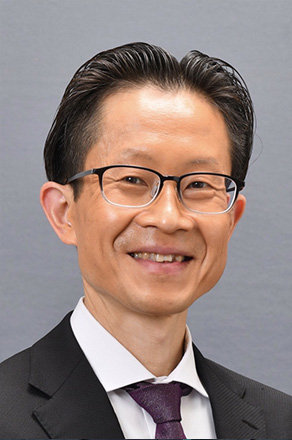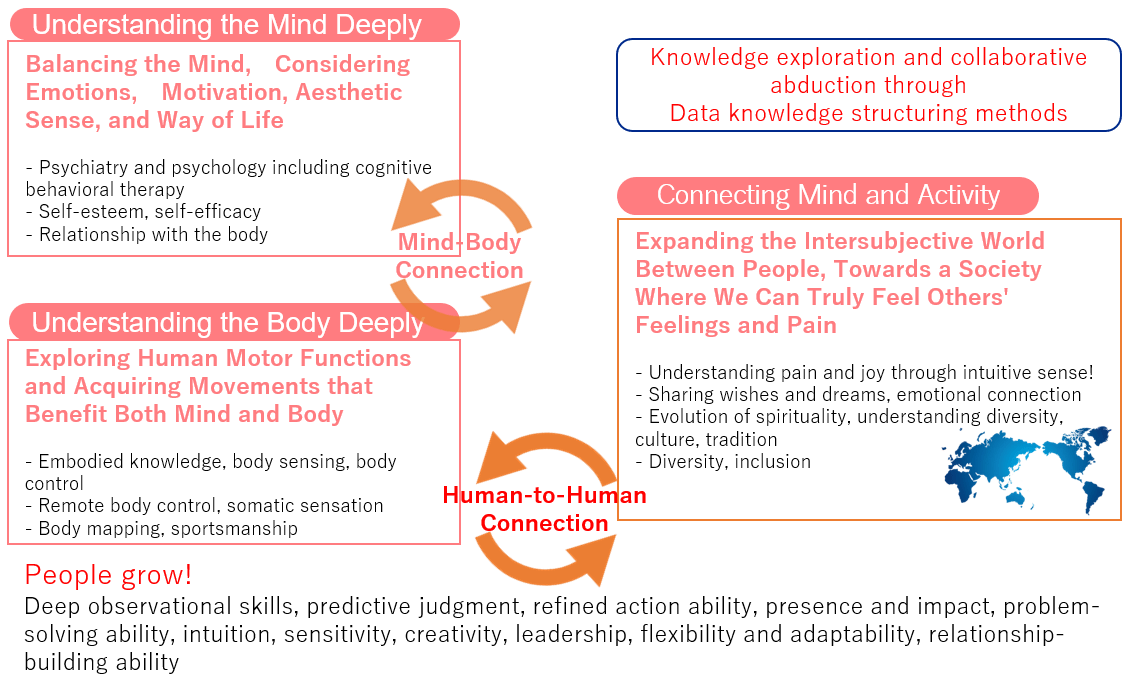
We explore wild knowledge based on data-knowledge structuring technologies for collaborative abduction
Laboratory on Wild Knowledge Systems and Inquiry (WiKSI)
Professor:NISHIMURA Takuichi
E-mail:
[Research areas]
Artificial Intelligence, Knowledge Management, Service Engineering, Information Design, Health & Sports Science, Interaction, AR/VR
[Keywords]
Wild Knowledge, Tacit Knowledge, Data-Knowledge Structuring, Cognitive Science, Learning Support Systems, Intelligence Informatics, Systems Thinking, Ontology, Collaborative Abduction
Skills and background we are looking for in prospective students
We look for childlike curiosity, wildness and enthusiasm to help others. Let's enjoy research by discovering and developing your strengths, whether they be sensitivity to find wonder in small things, making things, programming skills, physical abilities, ability to make others laugh, empathy, writing skills, conceptual skills, resilience, or willingness to take on challenges.
What you can expect to learn in this laboratory
You will acquire knowledge structuring techniques to draw out experts' tacit knowledge, information design skills, and learning support technologies. Experts explore knowledge through various methods while seriously engaging in playfully. You will develop the ability to question the obvious, embrace changing perspectives, challenge yourself with new things, maintain lifelong curiosity to discover passionate interests, conduct ethical research reviews, create original work without plagiarism, and write academic papers.
【Job category of graduates】 manufacturing, service industries, agriculture/fisheries, consulting, and fields providing value through human interaction
Research outline
 Understanding Today's Challenges
Understanding Today's Challenges
We live in rapidly changing times where the future is hard to predict. While AI can now generate answers based on existing human knowledge, we focus on using AI to enhance human intuition, creativity, and discovery. By questioning common assumptions and finding meaning in everyday experiences, we create new value and inspiration. This process helps you develop adaptability for an uncertain future.
Our Approach
We systematically capture the tacit knowledge and physical expertise of specialists, organizing it alongside real-world examples. We help transfer knowledge that is difficult to express in words alone. Experts can create solutions instantly in new situations, and we also study this knowledge-creation process itself.
Three Key Research Areas
Working with companies and communities, we structure experts' intuition and tacit knowledge to dramatically improve their effectiveness using AI:
- Mental Health Services
Supporting psychological wellbeing through psychotherapy, music therapy, cognitive behavioral therapy, psychiatric care, dementia care, and workplace stress reduction, using insights from neuroscience and medicine. - Physical Movement Services
Supporting physical health through sports science and exercise instruction based on understanding complex body mechanics for health promotion, disability prevention, and preventive care. - Work Knowledge Services
Helping workers in manufacturing, caregiving, and community support perform their jobs effectively by organizing expert knowledge and presenting it in context-appropriate ways.
Key publications
-
Determining Partnering Effects in the “Rise and Fall” Motion of Competitive Waltz by the Use of Statistical Parametric Mapping, Yasuyuki Yoshida, Arunas Bizokas, Katusha Demidova, Shinichi Nakai, Rie Nakai, Takuichi Nishimura, Baltic Journal of Sport and Health Sciences 1(120) 4-12 2021.
-
Proposal of knowledge sharing framework for active learning and its application, Satoshi Nishimura, Ken Fukuda, Takuichi Nishimura, Masako Dohi, Proceedings of the European Conference on Knowledge Management, ECKM 2016.
-
A compact battery-less information terminal (CoBiT) for location-based support systems, Takuichi Nishimura, Hideo Itoh, Yoshinobu Yamamoto, Hideyuki Nakashima, Proceedings of SPIE - The International Society for Optical Engineering 4863 80-86 2002.
Equipment
Motion capture systems, force plates, eye-tracking equipment, knowledge structuring support systems, knowledge sharing systems
Teaching policy
We create an environment where laboratory members develop exploration skills, creativity, practical abilities, and conceptual thinking together. We maintain a positive atmosphere where everyone helps strengthen each other's unique talents. We expand our horizons by collaborating with other laboratories, universities, research institutes, companies, and field practitioners. We develop new technologies and methods and improve them in real-world settings. Rather than focusing solely on external metrics, we pursue research that inspires us and follows our passions. Through our research journey, we cultivate our ability to ask meaningful questions.